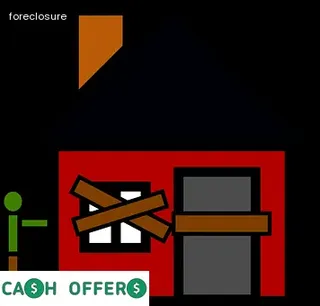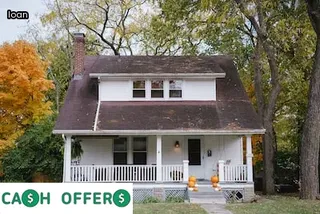Foreclosure is a legal process that can be extremely stressful for homeowners in Arkansas. It starts with a Notice of Default from the lender, which states that the homeowner is behind in their mortgage payments.
The homeowner then has thirty days to catch up on their payments or enter into a payment plan with their lender. After the thirty days have passed, the lender can file for foreclosure.
The process of foreclosure usually takes about six months, during which time the homeowner has the opportunity to catch up on their payments and redeem their home. At any point during the foreclosure process, if the homeowner does not make any progress towards catching up on their payments or entering into a payment agreement with their lender, they may lose possession of their property and face eviction.
Understanding how long it takes to complete a foreclosure in Arkansas is an important part of ensuring homeowners are prepared to act quickly when they receive a Notice of Default from their lender.

The preforeclosure period is the time between when a homeowner fails to make their mortgage payments and when the lender initiates foreclosure proceedings. During this period, homeowners in Arkansas must remain aware of their rights and obligations as well as the timeline that they are facing.
Homeowners should be aware that during this period, they may receive notices from their lender or an attorney representing the lender that outlines the terms of their delinquency and any fees associated with it. Also, during this preforeclosure period, Arkansas law requires lenders to give homeowners an opportunity to cure the delinquency by making up all past-due payments, late charges, fees and other costs associated with the loan.
Homeowners are obligated to understand these requirements and take action if they wish to avoid foreclosure. Furthermore, a homeowner must take responsibility for ongoing mortgage payments throughout this preforeclosure period even if they have received a notice of default or an intent to foreclose.
Failing to do so could result in foreclosure proceedings being initiated against them sooner than expected. It is important for Arkansas homeowners facing financial hardship due to delinquent mortgage payments to stay informed about their rights and obligations during this preforeclosure period in order to better protect themselves from potential foreclosure.
In Arkansas, a homeowner can face two types of foreclosure: judicial foreclosure and non-judicial foreclosure. Judicial foreclosure is the more commonly used type in Arkansas and requires the lender to sue the homeowner in court.
They must then prove that the borrower has defaulted on their loan agreement and provide them with a notice of default. A judge will usually make a decision within 60 days of filing, which may include granting the lender’s right to foreclose on the property.
Non-judicial foreclosure, also known as power of sale, does not require court involvement and instead allows lenders to use an outside party to sell the home if it goes into default. This process is often quicker than judicial foreclosure but is less common in Arkansas.
The exact timeline for both types of foreclosure depends upon a variety of factors like how quickly borrowers respond to notices or court proceedings and whether or not they have hired an attorney.

The nonjudicial foreclosure process, which is the most common form of foreclosure in Arkansas, can take anywhere from a few months to a year or more depending on the circumstances. This type of foreclosure is typically initiated by the mortgage lender when a borrower fails to make payments as outlined in their loan agreement.
To begin this process, the lender will file a Complaint of Foreclosure and Sale with the county court in which they hold title. From there, notice will be given to the homeowner that they are being foreclosed upon and they will have fifteen days to respond.
If the homeowner does not respond within this timeframe, then the lender may move forward with sale proceedings without court approval. The home will then be put up for auction and if it does not sell at auction, it will be turned over to the lender who holds title and can then repossess it.
During this entire process, homeowners have certain rights that protect them from unfair practices by lenders. It is important for homeowners facing foreclosure to understand these rights so that they can make sure their interests are being protected throughout the entire process.
Failing to make mortgage payments can have serious consequences for homeowners in Arkansas. When payments are missed, the lender may start foreclosure proceedings which could result in the homeowner losing their home and possibly any equity they had built up.
The amount of time it takes to complete a foreclosure process in Arkansas can vary depending on several factors such as the court system, whether or not the borrower is contesting the foreclosure, and if there are any other legal complications. Missing payments could also result in late fees, damage to credit score, collection calls and letters from creditors, and potential legal action from lenders.
Additionally, unpaid debts may be reported to credit bureaus which could further harm a person's credit score or even prevent them from obtaining new loans or mortgages in the future.

When homeowners in Arkansas face foreclosure, they must be aware of the breach letter requirements and deadlines. This requires them to receive a notice that outlines their rights and obligations before the lender begins the foreclosure process.
The notice will provide the homeowner with information on their right to cure any delinquency and details on how to contact an attorney or housing counselor. It is important to act quickly upon receiving this notice as there are strict deadlines for filing a response.
A homeowner may need to file a Response Form within 20 days of receipt of the breach letter in order to challenge or dispute it. Furthermore, any payment made towards curing the delinquency must be received by the lender no later than 30 days after receipt of the breach letter.
Otherwise, without timely action from the homeowner, foreclosure proceedings can begin immediately following expiration of these deadlines.
As an Arkansas homeowner facing foreclosure, it's important to understand what your rights are and the opportunities to reinstate your loan before a sale occurs. Arkansas law allows lenders to foreclose on a home if certain conditions are met, such as defaulting on loan payments or failing to comply with terms of the mortgage agreement.
Homeowners have certain rights under this law including receiving notice of the foreclosure and having the opportunity to reinstate their loan by paying past due amounts prior to the sale. During foreclosure proceedings, homeowners also have the right to be heard in court if they wish to dispute any claims made by the lender.
Additionally, there may be certain state-mandated programs available that could help homeowners in danger of foreclosure stay in their homes such as mortgage assistance programs or loan modifications. It's important for homeowners facing foreclosure in Arkansas to understand these rights and options so they can make an informed decision about how best to proceed with their situation.

In Arkansas, once a foreclosure sale is complete, there is no redemption period for the former homeowner.
This means that once the buyer has purchased the property at the foreclosure auction, the previous owner has no chance to reclaim it through any legal means.
In addition, all rights of ownership are immediately transferred to the buyer at this point in time.
As such, before making a decision to purchase a home in foreclosure, it's important to understand how long this process can take as well as what your rights are as a buyer and seller after the sale has been completed.
When facing foreclosure, it is important to ask an attorney the right questions. Homeowners should inquire about their rights and the foreclosure process in Arkansas, particularly how long it takes.
It is also important to ask if there are any state or federal laws that could impact the timeline of foreclosure or prevent the lender from taking legal action. Additionally, homeowners should be aware of any other options they may have, such as loan modifications or refinancing, that can help them keep their home.
They should also ask about the potential financial and legal ramifications of letting a property go into foreclosure. Understanding all of these issues is essential for homeowners when dealing with a foreclosure in Arkansas.

In the state of Arkansas, the foreclosure process begins when a homeowner falls behind in their mortgage payments. The lender will then send out a notice of default, which is a written notification that the borrower has not met their financial obligations on the loan.
After receiving this notice, the homeowner typically has 30 days to pay off the debt or to enter into an agreement with the lender to make up for any missed payments. If no payment is made or agreement is reached, then the lender can move forward with filing for foreclosure in court.
This legal action marks the official start of foreclosure proceedings and typically takes anywhere from 60-90 days before an order of sale is issued by a judge.
The laws governing foreclosure in Arkansas are a combination of federal and state laws. Arkansas is a judicial foreclosure state, meaning that foreclosures must go through the courts.
This process can take anywhere from three to eighteen months, depending on whether the homeowner is able to negotiate a loan modification or repayment plan with the lender. The actual foreclosure process begins when the mortgage servicer files a complaint with the court, requesting permission to begin the foreclosure process.
After this filing, an official notice must be sent to both parties informing them of an upcoming court hearing. If a repayment plan or loan modification is not agreed upon at this time, the judge will then issue an order for sale for the property.
At this point, the home will be sold at auction and title transferred to a third party buyer. The final step in the foreclosure process is when all proceeds from the auction are used by lenders to pay off any remaining debt on the mortgaged property.

The foreclosure process in Arkansas can be complicated and lengthy, often taking anywhere from three to six months from start to finish. It begins when the lender files a complaint with the court, officially starting the foreclosure proceedings.
The homeowner will then be served with a summons and complaint, informing them of the lender's intention to foreclose on their property. After being served, homeowners have 30 days to respond with an answer or other legal action.
If they fail to do so, a default judgment may be entered against them. Next, the lender must have the home appraised and obtain a court order authorizing sale of the property.
During this period, Arkansas law allows borrowers to still redeem their property by paying all past due payments plus interest and costs associated with the foreclosure proceedings up until five days before the sale date. Once all of these steps are complete, the foreclosure is finalized on auction day when bidders come together and bid on properties that are going into foreclosure.
Arkansas homeowners facing foreclosure may be able to delay or even avoid the process by taking advantage of potential alternatives. Homeowners can work with their lenders to develop a repayment plan for past due payments, which is one option that may help them stay in their homes.
Refinancing is another possible solution and may involve the lender agreeing to lower the interest rate or extend the loan term. The homeowner may also be able to negotiate a forbearance agreement, which allows them to reduce or suspend mortgage payments for a period of time.
Additionally, it may be possible to obtain a loan modification if the homeowner's financial situation has changed since they first obtained their mortgage. Finally, it is important for homeowners to explore all available government programs that could help them keep their home, as there are many state and federal programs designed specifically to assist with foreclosure prevention.

When homeowners are facing foreclosure in Arkansas, they may have many questions and feel overwhelmed. Working with a skilled attorney can provide invaluable assistance throughout the process.
An experienced attorney can work with lenders to negotiate a loan modification that helps to avoid foreclosure. A lawyer can also represent the homeowner in court if needed, ensuring that the lender complies with all state laws and regulations regarding foreclosures.
An attorney can help file documents such as a motion for sale or an answer to the complaint, which both must be filed within certain time frames. In some cases, an attorney may be able to pursue other legal remedies on behalf of a client, such as filing for bankruptcy or negotiating alternative payment arrangements.
No matter what assistance is needed during a foreclosure, an experienced attorney will be able to provide advice and guidance every step of the way.
Prior to filing for foreclosure, it is important that homeowners in Arkansas attempt to negotiate with their lender. Negotiations can help the homeowner avoid going through a lengthy foreclosure process and potentially save them money.
There are several strategies that homeowners should consider when negotiating with their lender. Firstly, they should be open and honest about their current financial situation and be prepared to provide evidence of their income or other documents to support their case.
Secondly, they should remain patient and persistent because lenders may take time to respond or offer a solution. Thirdly, they should consider consulting a legal expert if negotiations become complex or contentious.
Finally, homeowners should consider the various loan modification options that may be available as an alternative to foreclosure such as a loan refinance or forbearance agreement. By understanding these strategies and implementing them during negotiations with their lender, Arkansas homeowners can potentially save themselves from going through the long and complex foreclosure process.

Homeowners in Arkansas facing foreclosure often make the same mistakes when going through the process. Failing to respond to notices or paperwork sent by the lender is a common mistake, as is ignoring court dates or requests for additional information.
Another error is missing payments while attempting to negotiate with the lender, which can result in acceleration of foreclosure proceedings. Additionally, homeowners should be aware of their rights and responsibilities under Arkansas foreclosure law and make sure they are following all deadlines set by the court.
It's also important to remember that lenders have no obligation to offer alternative payment plans or loan modifications, so any agreements should be written down or documented in some way. Finally, homeowners should work with a qualified attorney who understands state law and can provide legal advice throughout the process.
When a foreclosure sale is completed in Arkansas, homeowners should be aware of the potential tax implications. It’s important to note that any debt forgiven in a foreclosure or short sale may be considered taxable income by the Internal Revenue Service (IRS).
Additionally, you may be subject to taxes on any deficiency balance owed after the foreclosure process has been completed. In some cases, homeowners may also be responsible for capital gains taxes if the total amount of money they receive from the sale exceeds their original purchase price.
It's essential to consult with a qualified tax professional who can provide guidance and help you understand your unique situation.

In Arkansas, homeowners who have gone through a foreclosure sale may still be able to retain their property rights depending on the regulations in place. The state of Arkansas follows a deed-of-trust foreclosure system, which allows lenders to sell the borrower's home at an auction if they are unable to make payments on their mortgage loan.
If the lender is successful in selling the home, then there are certain regulations that must be followed before the new property owner can take ownership. In order for the new property owner to gain access to their newly purchased home, they must first obtain a court order granting them possession of the property from an Arkansas Circuit Court.
This court order will also specify any conditions or restrictions that may apply regarding the transfer of title and registration of the newly acquired property. Additionally, it is important for the new owner to understand that although they have legally purchased the home at a foreclosure sale, they may still be liable for any unpaid bills or taxes that were due prior to them acquiring it.
For Arkansas homeowners facing foreclosure, consulting with an experienced Arkansas lawyer is essential to understanding the legal rights and obligations of all parties involved. Foreclosure laws in the state are complex and can vary widely depending on the particular county or city.
A knowledgeable attorney can provide valuable assistance in navigating the proceedings, including help in garnering a better understanding of the timeline for foreclosures in Arkansas. In addition, an experienced lawyer can also be a great asset when it comes to providing insight into potential defenses that may be available to homeowners.
From advising on options such as loan modifications and other relief programs, to addressing any potential issues that could arise during a foreclosure process, having an experienced attorney by your side throughout these challenging times is essential for anyone facing foreclosure in Arkansas.

Preforeclosure is a process that can help homeowners in Arkansas who are facing foreclosure. It is an option to avoid the lengthy and often costly process of a full foreclosure.
During preforeclosure, the homeowner has the chance to negotiate with their lender to come up with a solution that works for both parties. This could include loan modification so that the homeowner can make payments on time, or even selling the home before it goes to full foreclosure.
Preforeclosure helps homeowners keep their credit in tact and avoid having a foreclosure on their record. It also gives them more time to find another property or work out an arrangement with their lender.
In addition, preforeclosure helps lenders by avoiding expensive court costs associated with a full foreclosure process and allows them to recoup some of the money lost from delinquent mortgage payments.
Foreclosing on a house in Arkansas can take anywhere from two months to several years. In most cases, the foreclosure process begins when a mortgage lender sends the homeowner an official notice of default.
From there, the homeowner has thirty days to pay off the entire balance due or make other arrangements with the lender. If no payment is made within that time frame, then the lender can file for foreclosure and take possession of the property.
The length of time it takes from filing for foreclosure to actually taking possession of the property varies widely between counties. Generally, it can take anywhere from two months to six months in some counties and up to two years or more in others.
Knowing how long it takes to foreclose on a house in Arkansas is important for homeowners who are facing financial difficulties and need time to make arrangements with their lenders or work out a repayment plan. It's also important for those looking to purchase foreclosed properties as they can plan accordingly and be prepared when their dream home becomes available.

The foreclosure process in Arkansas is an arduous one and typically takes anywhere from 90 days to 6 months or more. It begins with the lender or servicer filing a complaint with the court, which issues a summons for homeowners to appear before the judge for further proceedings.
The homeowner then has 20 days to respond to the summons, after which time the court will issue an order of foreclosure if the homeowner does not comply. After this order is issued, a public auction of the property will be conducted within 30 to 60 days and must be advertised for at least 21 days.
If none of the bids are satisfactory, then the lender can take possession of the property after 10 days. Finally, once all payments have been made and paperwork is filed properly, foreclosure proceedings in Arkansas are complete.
If you're a homeowner in Arkansas facing foreclosure, you may be wondering how to stop it. Fortunately, there are several options available to help you avoid foreclosure and save your home.
One of the most effective ways to prevent foreclosure is to talk to your lender and try to negotiate a repayment plan that works for both parties. You may also be able to take advantage of special programs offered by the state or federal government.
These can include loan modification, forbearance or even refinancing. Additionally, filing for bankruptcy can provide a temporary reprieve from foreclosure while you work on resolving other financial issues.
In any case, it's important to act quickly and consult an experienced attorney if you're facing foreclosure in Arkansas. With the right guidance, you can find solutions that will allow you to keep your home and move forward with financial security.
In Arkansas, the amount of time from when a homeowner falls behind on their mortgage payments until they go into foreclosure is typically 6 months. After the 6-month mark, the lender will typically file for foreclosure and it becomes a matter of public record.
Homeowners should be aware that if they do not bring their mortgage current in this timeframe, the foreclosure process can begin. The length of time it takes to complete a foreclosure in Arkansas varies depending on how quickly courts are able to move forward with the process and how many parties are involved.
Therefore, it is important to contact an experienced real estate attorney if you are facing a possible foreclosure, as they can review all of your options and help protect your rights during this difficult time.
A: The timeline for a foreclosure in Arkansas can vary depending on the individual situation. Generally speaking, the process may take anywhere from 4 to 10 months depending on whether bankruptcies or bankruptcy protection are filed, if lawyers are involved and the amount of indebtedness owed.
A: The foreclosure process in Arkansas can vary from 30 to 90 days when considering deeds of trust, trust deed, deed of trust sales and trustee.

A: Foreclosure timelines vary in Arkansas depending on the type of loan and the situation involved. Generally speaking, the process can take anywhere from two to four months if no loss mitigation or bankruptcy protection is requested. If there is an attorney involved, or if indebtedness is an issue, the process may take longer.
A: The foreclosure process in Arkansas can vary greatly depending on several factors, such as whether or not the borrower files for bankruptcy protection, if there are lawyers involved, and the level of indebtedness. Generally speaking, foreclosures in Arkansas can take anywhere from 45 to 90 days to complete.
A: The time frame for a foreclosure in Arkansas can vary widely and depends on factors such as the homeowner's bankruptcy protection, any legal representation, and the level of indebtedness. On average, however, a foreclosure process typically takes between three to six months.

A: The Arkansas Homeowners Guide states that the foreclosure process typically takes between 90 and 120 days.
A: The foreclosure process in Arkansas can take anywhere from 45 to 90 days, depending on the complexity of the case and other factors as determined by HUD.
A: Foreclosure proceedings in Arkansas typically take at least 120 days to complete. The timeline may vary depending on the complexity of the case and the availability of documents such as Promissory Notes or records related to Mortgage Servicing. All communication between parties should be done via phone calls for accuracy.
A: The timeline of a foreclosure depends on factors like the type of security instrument involved (deed of trust, trust deed, etc.) and the county where the property is located. Generally speaking, it can take anywhere from three months to two years for a foreclosure in Arkansas to be completed. However, there are steps that homeowners can take to avoid or delay foreclosure proceedings.
A: The length of time for a foreclosure to be completed in Arkansas varies depending on the specifics of each individual situation and can range from as little as a few days to several months. Bankruptcy protection, lawyers, deeds of trust or trust deed sales, and indebtedness can all factor into how long the process will take.
A: In Arkansas, the foreclosure process can take approximately 4 to 6 months from the time of service via Certified Mail and Levy.
A: Foreclosures in Arkansas typically take between two to three months from start to finish. This timeline may be affected by the current pandemic and appraisals, as well as any privacy laws associated with the process and any newspaper notices that must be given.
A: The length of the foreclosure process in Arkansas will vary depending on the state's foreclosure laws and the lender's practices. Generally, it can take anywhere from two to six months for a foreclosure to be completed. This timeline can be impacted by factors such as the number of lien holders involved, the frequency of debt collection efforts, and any marketing associated with the sale of the property.